- Home
- Laptops
- Laptops Reviews
- Asus Zenbook Review
Asus Zenbook Review
By Sameer Mitha | Updated: 5 June 2012 16:24 IST
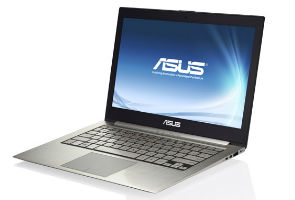
Advertisement
MacBook Air killers are finally amongst us in the form of Intel's latest category of high performing, light and slim notebooks called Ultrabooks. We recently reviewed the debutant among these, the Acer Aspire S3 Ultrabook. Today we have another contender ready to gun down the MacBook Air. Is it a worthy opponent?
Build/Design and Ports
Asus has gone all out with the looks of the Zenbook and taken a leaf from the MacBook Air design. In terms of its weight and dimensions, it is almost identical to the Air. You will not be able to make out the difference with the naked eye. The device even has a tapering design from its thickest to its thinnest point.
The aluminum lid has an attractive circular design and the device overall feels very solid and well-built. The build quality is far superior to the Acer Aspire S3 Ultrabook.
In terms of connectivity, the device comes well loaded. The left of the device has a USB 2.0 port along with a headphones jack and an SD card slot. On the right of the device we have a USB 3.0 port (which the Acer lacked), a mini VGA port and a micro HDMI port. It should be noted that you do get a USB to Ethernet adapter and a VGA adapter in the box with the device, which is a very good addition. As for the MacBook Air, these accessories have to be purchased separately.
All the ports are neatly located on either side and the overall look, feel and first impressions of the device are fantastic. So far, a perfect contender to take on Apple's slim beauty.
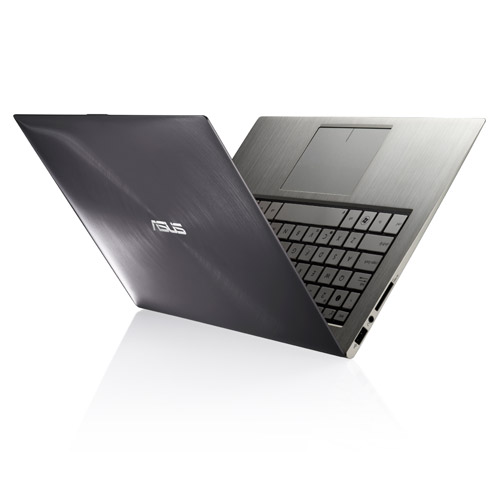
Keyboard and track pad
The keyboard is chicklet style, well laid out and doesn't compromise on the size of essential keys such as enter and directional keys when compared to the Acer. Having said that, the keys aren't the most comfortable to type on in the first instance. This is because they lack depth, so typing feels a bit rigid. The keys aren't backlit like the Air either.
The trackpad also has a similar story to tell. It is nearly as large as the one on the Air in size, but feels light years behind in terms of utility. It is a bit sluggish to use at first, and once you have brought it up to speed by adjusting the settings, the performance improves marginally.
The multi-touch of the trackpad too isn't something to boast off as it isn't very responsive and there are moments when the curser jumps all over the screen. While typing on the keyboard too, we found that a slight touch of the palm on the trackpad causes it to react dramatically. This is definitely an area where Asus needs to improve on the device in its next iteration.
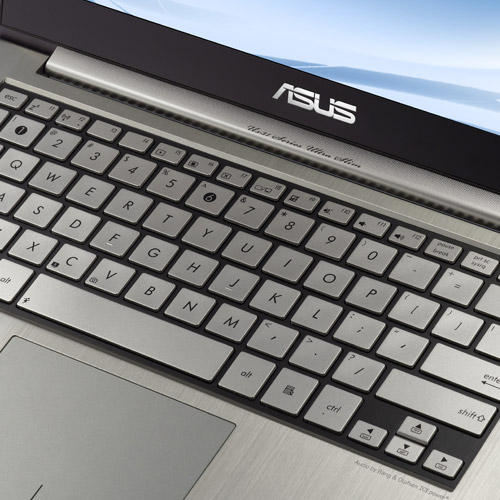
Display and audio
The display on the Asus Zenbook has a definite edge over the MacBook Air as it boasts of a resolution of 1600x900 where as the Air has a resolution of 1400x900. We ran a couple of 1080p movies on the machine and they played smoothly without any hiccups. The colours look vibrant and a single person can have an enjoyable viewing experience to the device. The downside here is that the viewing angles of the device are bad.
For its audio output, the Zenbook boasts of B&O speakers and we must admit they rank very high. For such a slim and light machine the speakers had a thumpy and clear bass (very difficult to find on a slim laptop), good low and mid range frequencies and sharp treble. Put simply, the speakers on this device are really good and pack quite a punch especially if you consider the size of the device.
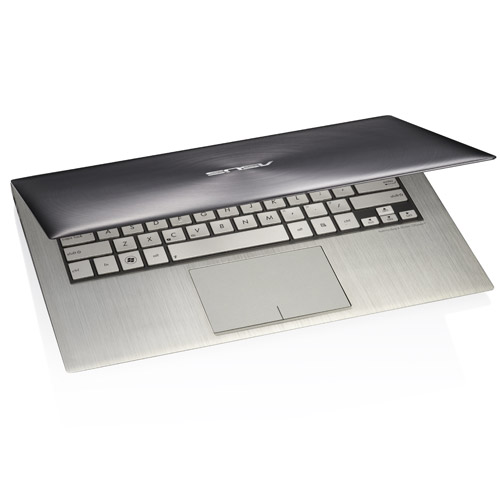
Performance
Apart from all the entertainment value that an Ultrabook can offer, the power under the hood should be able to take care of mundane everyday activities such as browsing the web, MS office and more. The performance of the Zenbook here is great. It got through all everyday activities with no problem.
As far as horsepower is concerned, the device offers you a Windows 7 Home Premium 64bit OS, 4GBRAM, an Intel Core i7 processor clocked at 1.80GHz, Intel HD graphics, 256GB SSD and Bluetooth 4.0.
With an SSD under the hood, the boot time of the device is swift and fast, under 20sec, which beats the Acer Aspire S3 by 17sec. The sleep-to-wake time too is great at under 2sec.
In the benchmark scores, the device performed quite well scoring 4086 on the 3D mark. This means that you can expect to run most modern day games on the device but not at their highest settings. This is a leap ahead when compared to the Acer Aspire S3, which scored a mere 3239.
On the PC mark, the Zenbook scored 7872, which is really good and ensures that you can perform multi-tasking on the device with absolute ease if the apps you are running aren't too heavy duty.
On the battery mark, and this one is a killer, the device ran for 3 and a half hours in high performance mode with full brightness and 100% load on the CPU. That's great. We used the device conservatively too with average everyday work on a full charge and the device lasted for almost 6 hours. Needless to say the battery life on this device is really good. All the benchmark tests we performed on it were conducted in high performance mode.
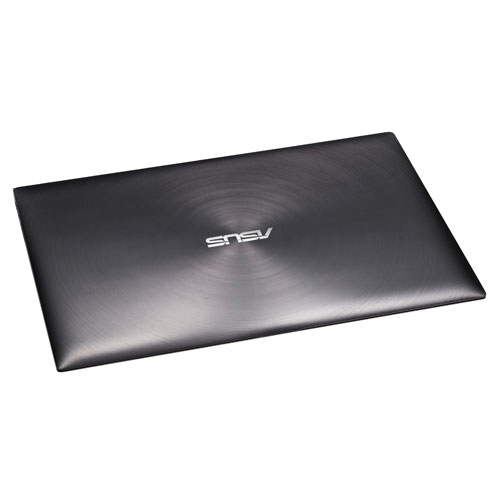
Verdict
Overall, the device is a great candidate to represent the first generation Ultrabooks. You may even consider picking this one up if a slim performing beauty is what you need. But hold on. The price tag on the device is a whopping Rs. 89,990. That's nearly double the price of the Acer Aspire S3 (Which costs 50k) and here's the shocker, costs exactly the same amount as the top of the line 13-inch MacBook Air. In comparison, the MacBook Air offers you better value for money but if Windows is your choice of OS and you can overlook the average performing keyboard and troublesome trackpad, you can give this one a second glance.
Price: Rs, 89,990
Pros:
Great screen resolution
Very Slim and light
Attractive design
USB 3.0
Good speakers
Good hardware performance
Cons:
Expensive when compared to the competition
Trackpad and keyboard are a let down
Bad viewing angles
Score:
Performance: 4
Price: 3
Ease of setup: 5
Ergonomics: 5
Wow Factor: 4.5
Overall: 3.5
Build/Design and Ports
Asus has gone all out with the looks of the Zenbook and taken a leaf from the MacBook Air design. In terms of its weight and dimensions, it is almost identical to the Air. You will not be able to make out the difference with the naked eye. The device even has a tapering design from its thickest to its thinnest point.
The aluminum lid has an attractive circular design and the device overall feels very solid and well-built. The build quality is far superior to the Acer Aspire S3 Ultrabook.
In terms of connectivity, the device comes well loaded. The left of the device has a USB 2.0 port along with a headphones jack and an SD card slot. On the right of the device we have a USB 3.0 port (which the Acer lacked), a mini VGA port and a micro HDMI port. It should be noted that you do get a USB to Ethernet adapter and a VGA adapter in the box with the device, which is a very good addition. As for the MacBook Air, these accessories have to be purchased separately.
All the ports are neatly located on either side and the overall look, feel and first impressions of the device are fantastic. So far, a perfect contender to take on Apple's slim beauty.
Keyboard and track pad
The keyboard is chicklet style, well laid out and doesn't compromise on the size of essential keys such as enter and directional keys when compared to the Acer. Having said that, the keys aren't the most comfortable to type on in the first instance. This is because they lack depth, so typing feels a bit rigid. The keys aren't backlit like the Air either.
The trackpad also has a similar story to tell. It is nearly as large as the one on the Air in size, but feels light years behind in terms of utility. It is a bit sluggish to use at first, and once you have brought it up to speed by adjusting the settings, the performance improves marginally.
The multi-touch of the trackpad too isn't something to boast off as it isn't very responsive and there are moments when the curser jumps all over the screen. While typing on the keyboard too, we found that a slight touch of the palm on the trackpad causes it to react dramatically. This is definitely an area where Asus needs to improve on the device in its next iteration.
Display and audio
The display on the Asus Zenbook has a definite edge over the MacBook Air as it boasts of a resolution of 1600x900 where as the Air has a resolution of 1400x900. We ran a couple of 1080p movies on the machine and they played smoothly without any hiccups. The colours look vibrant and a single person can have an enjoyable viewing experience to the device. The downside here is that the viewing angles of the device are bad.
For its audio output, the Zenbook boasts of B&O speakers and we must admit they rank very high. For such a slim and light machine the speakers had a thumpy and clear bass (very difficult to find on a slim laptop), good low and mid range frequencies and sharp treble. Put simply, the speakers on this device are really good and pack quite a punch especially if you consider the size of the device.
Performance
Apart from all the entertainment value that an Ultrabook can offer, the power under the hood should be able to take care of mundane everyday activities such as browsing the web, MS office and more. The performance of the Zenbook here is great. It got through all everyday activities with no problem.
As far as horsepower is concerned, the device offers you a Windows 7 Home Premium 64bit OS, 4GBRAM, an Intel Core i7 processor clocked at 1.80GHz, Intel HD graphics, 256GB SSD and Bluetooth 4.0.
With an SSD under the hood, the boot time of the device is swift and fast, under 20sec, which beats the Acer Aspire S3 by 17sec. The sleep-to-wake time too is great at under 2sec.
In the benchmark scores, the device performed quite well scoring 4086 on the 3D mark. This means that you can expect to run most modern day games on the device but not at their highest settings. This is a leap ahead when compared to the Acer Aspire S3, which scored a mere 3239.
On the PC mark, the Zenbook scored 7872, which is really good and ensures that you can perform multi-tasking on the device with absolute ease if the apps you are running aren't too heavy duty.
On the battery mark, and this one is a killer, the device ran for 3 and a half hours in high performance mode with full brightness and 100% load on the CPU. That's great. We used the device conservatively too with average everyday work on a full charge and the device lasted for almost 6 hours. Needless to say the battery life on this device is really good. All the benchmark tests we performed on it were conducted in high performance mode.
Verdict
Overall, the device is a great candidate to represent the first generation Ultrabooks. You may even consider picking this one up if a slim performing beauty is what you need. But hold on. The price tag on the device is a whopping Rs. 89,990. That's nearly double the price of the Acer Aspire S3 (Which costs 50k) and here's the shocker, costs exactly the same amount as the top of the line 13-inch MacBook Air. In comparison, the MacBook Air offers you better value for money but if Windows is your choice of OS and you can overlook the average performing keyboard and troublesome trackpad, you can give this one a second glance.
Price: Rs, 89,990
Pros:
Great screen resolution
Very Slim and light
Attractive design
USB 3.0
Good speakers
Good hardware performance
Cons:
Expensive when compared to the competition
Trackpad and keyboard are a let down
Bad viewing angles
Score:
Performance: 4
Price: 3
Ease of setup: 5
Ergonomics: 5
Wow Factor: 4.5
Overall: 3.5
Comments
For the latest tech news and reviews, follow Gadgets 360 on X, Facebook, WhatsApp, Threads and Google News. For the latest videos on gadgets and tech, subscribe to our YouTube channel. If you want to know everything about top influencers, follow our in-house Who'sThat360 on Instagram and YouTube.
Popular on Gadgets
- Samsung Galaxy Unpacked 2025
- ChatGPT
- Redmi Note 14 Pro+
- iPhone 16
- Apple Vision Pro
- Oneplus 12
- OnePlus Nord CE 3 Lite 5G
- iPhone 13
- Xiaomi 14 Pro
- Oppo Find N3
- Tecno Spark Go (2023)
- Realme V30
- Best Phones Under 25000
- Samsung Galaxy S24 Series
- Cryptocurrency
- iQoo 12
- Samsung Galaxy S24 Ultra
- Giottus
- Samsung Galaxy Z Flip 5
- Apple 'Scary Fast'
- Housefull 5
- GoPro Hero 12 Black Review
- Invincible Season 2
- JioGlass
- HD Ready TV
- Laptop Under 50000
- Smartwatch Under 10000
- Latest Mobile Phones
- Compare Phones
Latest Gadgets
- Moto G15 Power
- Moto G15
- Realme 14x 5G
- Poco M7 Pro 5G
- Poco C75 5G
- Vivo Y300 (China)
- HMD Arc
- Lava Blaze Duo 5G
- Asus Zenbook S 14
- MacBook Pro 16-inch (M4 Max, 2024)
- Honor Pad V9
- Tecno Megapad 11
- Redmi Watch 5
- Huawei Watch Ultimate Design
- Sony 65 Inches Ultra HD (4K) LED Smart TV (KD-65X74L)
- TCL 55 Inches Ultra HD (4K) LED Smart TV (55C61B)
- Sony PlayStation 5 Pro
- Sony PlayStation 5 Slim Digital Edition
- Blue Star 1.5 Ton 3 Star Inverter Split AC (IC318DNUHC)
- Blue Star 1.5 Ton 3 Star Inverter Split AC (IA318VKU)
© Copyright Red Pixels Ventures Limited 2024. All rights reserved.












